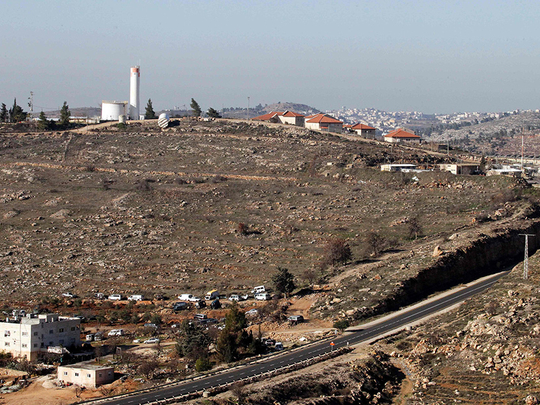
Washington: President Donald Trump won’t centre his Israel-Palestinian policy goals around achieving a two-state solution to the conflict, a senior White House official said Tuesday, signalling a shift from a long-standing US position that’s underpinned years of unsuccessful peace talks.
Briefing reporters ahead of Israeli Prime Minister Benjamin Netanyahu’s Wednesday visit to the White House, the official said the president believes that whether peace comes in the form of Palestinian statehood is something both sides must agree to.
The official, who spoke on condition of anonymity to preview the meeting, said it’s Trump’s view that it’s not for the US to impose its vision for the terms of a peace deal. The official also said that a two-state solution without peace is not worthwhile.
Netanyahu is trying to recalibrate ties with Israel’s top ally after eight years of high-profile clashes with former President Barack Obama, in part over Israel’s policies toward the Palestinians. He sees a chance for a warmer relationship with Trump.
Trump’s position that peace isn’t dependent upon creating two separate nations could provide political cover to Netanyahu, who faces challenges from members of his governing coalition who oppose Palestinian statehood.
It also could be seen as a seismic shift in US policy toward the Israeli-Palestinian conflict, which has resisted resolution after more than two decades of negotiations.
“It is certainly a big deal politically in the sense it’s one of the strongest ways the Trump administration can communicate it is reversing the attitude of the Obama administration, which was zealously committed to the mantra of the two-state solution,” said Nathan Diament, executive director of the Orthodox Union, an organisation that serves the North American Jewish community.
“It communicates to the Palestinians, UN, Europeans and others that there is radically different thinking going on this front, and assumptions around negotiations made in the past aren’t in place now.”
Israeli Education Minister Naftali Bennett, who has been pressing Netanyahu to abandon his commitment to a two-state solution, wished the prime minister luck in his “historic meeting” at the White House on Wednesday. “For the first time in 24 years, we can pull ourselves out of the Palestinian state mud,” Bennett, Netanyahu’s chief political rival, said in a post on Twitter.
Kadoura Fares, a senior official in Palestinian President Mahmoud Abbas’s Fatah party told Israel Army Radio that there is no way to achieve peace without a Palestinian state.
“The Palestinian-Israeli conflict can only be solved by Palestinians and Israelis,” Fares said.
“It’s a historic mistake to go backward instead of going forward, because disregarding a people is not a solution, it’s a big illusion.”
Trump and Netanyahu are to hold a news conference at noon in Washington at the White House ahead of private meetings to discuss a range of topics expected to include Iran, Israeli colony expansion, a possible US embassy move to occupied Jerusalem, and steps to address a United Nations Security Council resolution that condemns Israeli colonies.
The White House has sent mixed messages on colonies — saying existing ones are not an obstacle to peace but that new construction is unhelpful — and seems in no hurry to fulfil a campaign pledge to move the US embassy to occupied Jerusalem from Tel Aviv, a measure likely to anger Palestinians and Muslims elsewhere.
“The interpretation in the world might be very nefarious,” said David Makovsky of the Washington Institute for Near East Policy, noting that the Republican Party showed signs of backing away from a two-state solution last year when it chose not to include language about it in its convention platform. “Trump has upended many policy orthodoxies and people may assume he genuinely is out to make a drastic change.”













